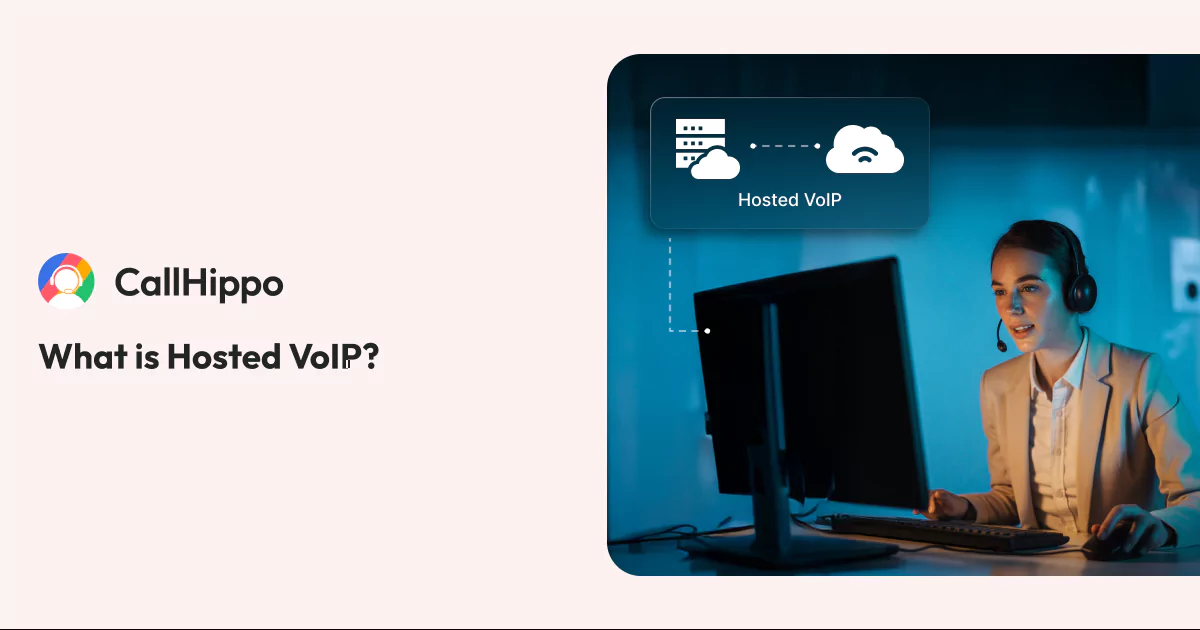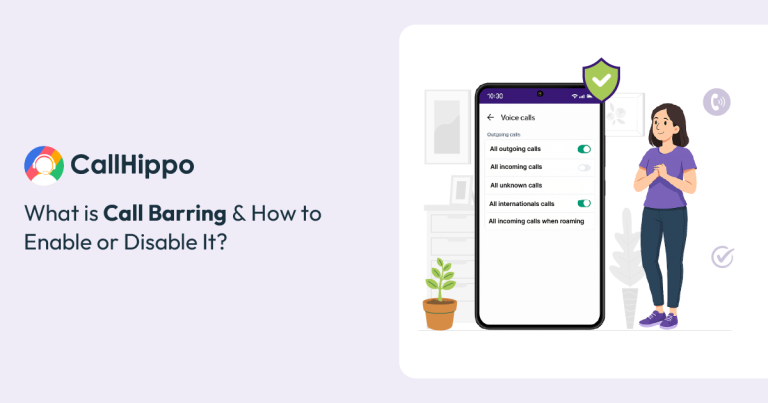

Updated : September 11, 2025
Running a business without a reliable business phone system is nearly impossible. But the old way of setting up phone lines with the Public Switched Telephone Network, buying bulky hardware, wiring everything, and paying for constant maintenance doesn’t make much sense anymore.
That’s where hosted VoIP solutions come in. Here, you just need an internet connection. Your service provider takes care of the rest. You get a modern phone system that’s easier to use, usually cheaper, and loaded with features that help teams stay connected.
In this guide, we’ll go over hosted VoIP in detail.
DID YOU KNOW?
- Experts predict internet calling will become a $236 billion industry by 2028, fueled by businesses and people ditching old phone systems for cheaper, smarter alternatives that work anywhere you have wifi..
What is Hosted VoIP?
Hosted VoIP is simply a phone system that runs on the internet. Unlike traditional setups, you don’t need a PBX (Private Branch Exchange) box sitting in your office or copper wires running through the walls. The provider hosts everything in their data centers, and you just connect through your devices.
You can use it on a desk phone, a computer, or even your mobile. All you really need is a steady internet connection. That’s why some people call it cloud-hosted VoIP or hosted telephony because the brains of the system sit in the cloud, not in your office.
Think of it this way: instead of buying and maintaining your own phone system, you’re basically renting one that’s already built and managed for you.
How Does Hosted VoIP Work?
When you speak into your phone, your voice gets turned into digital data. That data travels over the internet, and then it’s turned back into sound for the person on the other end.
Behind the scenes, your hosted VoIP provider handles all the tricky parts like routing the calls to your desktop or mobile phone, keeping servers running, and making sure security is in place. On your end, you only need:
- A stable internet connection
- A VoIP-compatible device (like a desk phone, laptop, or smartphone)
- A service plan with a provider
That’s it. No need for heavy hardware, no technicians visiting every time you add a new line, and no messy wiring.
Benefits of Hosted VoIP Solutions For Businesses
So, why are so many companies moving to a business-hosted PBX VoIP system? Here are the big reasons:
1. Simpler Management
Everything is handled online. Need a new number for a new hire? You can add one through your dashboard in a few clicks. No waiting for someone to come install it.
2. Improved Customer Service
Features like call forwarding, auto-attendants, and IVR menus help callers get to the right person without being bounced around. That alone can cut down frustration for customers and save time for your team.
3. HD Call Quality
With a good internet connection, the calls sound crisp, often better than old landline calls. You also avoid the static and background noise that used to be common on traditional phone lines.
4. Superior Reliability
Most hosted VoIP providers run their services across several data centers. If one goes down, your calls automatically get routed through another. That way, you’re not left disconnected.
5. Choice Of Number Type
Whether you need local numbers, toll-free lines, or international numbers, you can set them up through your provider. And if you don’t want to give up your old number, most providers let you port it over.
DID YOU KNOW?
- VoIP systems make it easier for people to work from anywhere, and many managers report that their hybrid and remote teams get about 62% more done compared to office-only teams.
Key Features Of A Hosted VoIP Phone System
Below are the features most businesses look for in a hosted VoIP phone system. I’ll explain what each one does and why it matters.
1. Call Forwarding And Routing
This is how calls get to the right place. Simple routing sends a call to one number. More advanced routing sends calls based on time of day, agent skill, or customer history. You can do simultaneous ringing (ring multiple phones at once) or sequential ringing (one number after another).
For contact centers, skill-based and queue routing are essential so the caller reaches someone who can help.
Tip. Map your most common call paths first. That helps you set routing rules that reduce transfers.
2. Auto-Attendant And IVR
An auto-attendant answers calls and offers a menu. IVR (interactive voice response) can let callers press numbers or speak a choice. Use it to point callers to sales, support, or billing. Keep menus short. Long menus frustrate callers. Most hosted telephony systems include easy tools to build these menus.
Example: Press 1 for sales. Press 2 for support.” That simple line saves time.
3. Voicemail To Email
Voicemail to email sends voicemails as audio files or as transcribed text to an inbox. It’s handy when staff work remotely or when managers want a quick record of messages. Some providers also store transcripts alongside audio so you can scan messages fast.
Note: Transcription quality varies. Treat transcripts as a quick summary, not a legal record.
4. Call Recording And Analytics
Recordings help with training and compliance. Analytics show call volume, wait times, and agent performance. Look for searchable recordings and basic reporting out of the box. Advanced systems add speech-to-text and sentiment metrics. If you run a support team, these features help you spot repeat issues and coach agents.
Policy Note: Check local laws before recording calls. Some regions require two-party consent.
5. Multi-device Accessibility
A hosted VoIP system should work on desk phones, softphones (apps on your laptop), and mobile apps. That means an employee can take a call on the desktop, then move to their phone without dropping it. Good providers keep these apps in sync and let admins control device access.
Tip: Test the mobile app before you roll out company-wide. Make sure call quality and feature parity meet your needs.
6. CRM And Business App Integrations
A key advantage of hosted VoIP systems is integration. Common plugs include Salesforce, HubSpot, Zendesk, and Microsoft Teams. Integrations let you click-to-call from a CRM, auto-log calls, and surface caller info during a call. If your team already uses a CRM, confirm the provider supports it.
7. Conference Call
Conferencing features vary. Basic systems give you bridge numbers and participant limits. More advanced ones include screen sharing, meeting links, and moderator controls. If your teams run many meetings, pick a provider with stable conference bandwidth and easy scheduling.
Hosted VoIP vs. Traditional Phone Systems
Hosted VoIP moves the phone system off-site and onto the internet. Traditional systems (on-prem PBX) keep the hardware in your office. Each has its pros and cons below:
| Criteria | Hosted VoIP | Traditional PBX / Landline |
|---|---|---|
| Upfront cost | Low: subscription model; little hardware | High: servers, wiring, phones |
| Maintenance | Provider handles updates and upkeep | Your team or vendor maintains hardware |
| Scalability | Add or remove lines fast | Adding lines often requires hardware and on-site work |
| Features | Modern features (IVR, analytics, integrations) are often included | Advanced features cost extra or are not available |
| Mobility | Works from anywhere with internet | Tied to office lines unless complex add-ons |
| Reliability | Depends on provider & internet connection; many run multiple data centers | Often reliable locally; needs failover planning |
| Control | Less direct control over hardware | Full control over on-site hardware |
Use Cases of Hosted VoIP
Hosted VoIP fits different kinds of business needs, and here are a few common situations where it proves useful:
1. Customer Support Centers
Support teams need queueing, call routing, recording, and analytics. Hosted VoIP systems can provide all of that without on-site PBX gear. They also let you add agents quickly during busy seasons
2. Sales Teams Managing Outbound Calls
Sales reps benefit from power dialers, click-to-call, local presence numbers, and call recording for training. Many hosted VoIP providers include power-dial features or integrate with sales tools so reps can call more efficiently.
3. Enterprises Handling Multi-location Communication
Large companies need consistent numbers, central admin, and integrations with business systems. Hosted VoIP lets you set global or local numbers for different regions and manage everything from a single dashboard. It simplifies multi-site phone management.
How to Choose the Right Hosted VoIP Provider?
Choosing the right provider feels a bit like finding the perfect business partner; it’s all about finding someone who gets what you need. Here’s what really matters when you’re shopping around:
1. Pricing And Plans
Don’t let that shiny per-user price fool you. There’s usually more lurking beneath the surface: minimum user requirements, bundled minutes that might not match your usage, and those “small” fees for features that feel pretty essential. Do yourself a favor and map out what you’ll actually pay based on how your team really uses the phone.
2. Reliability And Uptime Guarantees
When someone promises “99.9% uptime,” find out where they keep their servers and whether they’ve got backup locations. The smart providers spread their infrastructure around, so when one data center has a bad day, your calls don’t suffer.
3. Security Features
Your business conversations shouldn’t be anyone else’s business. Make sure they’re using proper encryption (look for SIP over TLS and SRTP), that they understand role-based access, and can play nice with your single sign-on setup. If you’re dealing with sensitive information, you’ll want to see their compliance certificates: SOC2, ISO, HIPAA, whatever applies to your world.
4. Integration With Existing Tools
If your CRM or helpdesk is central to work, confirm pre-built integrations or APIs. Integration lowers manual logging and speeds up workflows.
5. Customer Support And Training
Nobody wants to figure out a new phone system alone. Look for providers who’ll hold your hand through the setup, help you migrate from your old system, and actually train your people. Check what real customers say about getting help. Marketing brochures only tell part of the story.
6. Compliances
If you need to meet HIPAA, PCI, or other regulatory requirements, don’t assume they’ve got you covered. Ask for the specific documentation and make sure they really understand your industry’s requirements.
Quick Checklist for Vendor Conversations:
- what you’ll actually pay each month, what they guarantee for uptime, how they protect your data, which systems they connect to, what help they provide during the switch, and whether you can try before you buy.
Top Hosted VoIP Providers
The market’s packed with hosted VoIP companies, but only a handful have really earned their stripes through consistent reliability, useful features, and support that actually supports. Let’s look at the ones worth your time.
| Provider | Best For | Starting Price | Free Trial |
|---|---|---|---|
| CallHippo | Small and mid-sized businesses that need a flexible hosted VoIP system with global numbers | Starts from $0/user/month | 10-day free trial |
| Nextiva | Enterprises that want a full communication suite with calling, messaging, and video | Starts from $15/user/month | 7-day free trial |
| 8×8 | Companies with international teams and contact center needs | Pricing available on request | 30-day free trial |
| Dialpad | Remote teams that want browser-based calling, transcriptions, and CRM integrations | Starts from $15/user/month | 14-day free trial |
| Ooma | Small businesses looking for a low-cost hosted telephony service with essential features | Starts from $19.95/user/month | 60-day free trial |
1. CallHippo
CallHippo is a leading VoIP provider that focuses on quick setup for small and mid-size teams. It offers virtual numbers for many countries, a browser-based softphone, power dialer features, and CRM integrations. Good if you want fast setup and simple admin controls.
Features
Pros
- Many users say CallHippo is simple to set up and works smoothly on both desktop and mobile.
- Clear audio makes outbound calls more effective and helps teams communicate without interruptions.
- Customers often highlight the quick and helpful responses they get from the support team.
Cons
- Some users find the cost of numbers and messaging to be expensive compared to other providers.
- Problems like call log retention and frequent re-logins affect daily workflows for a few users.
Pricing
- Basic: $0/month
- Starter: $18/month
- Professional: $30/month
- Ultimate:$42/month
Try CallHippo Hosted VoIP Today!
A flexible phone system for your business that’s easy to set up and simple to use.
2. Nextiva
Nextiva markets a full-featured business communications platform. They combine VoIP with contact center tools, reporting, and broad integrations. Nextiva targets teams that want a unified experience across voice, chat, and support.
Features
- Auto attendants
- Call routing
- Call recording
- Video conferencing
- Team messaging
Pros
- The interface is intuitive, so adding users or adjusting settings doesn’t take much time.
- Calls, messages, video meetings, and integrations are handled from one place, which keeps things organized.
- Onboarding and ongoing help are responsive, with clear instructions and helpful guidance.
Cons
- Features like call recording may require additional fees beyond the base plan.
- Configuring advanced call routing or flow logic can require trial and error, especially at the start.
Pricing
- Core: $15/user/month
- Engage: $25/user/month
- Power suite: $75/user/month
3. 8×8
8×8 positions itself for both calling and contact center needs. They emphasize global reach, analytics, and built-in contact center features. If you need contact center routing plus voice, 8×8 is worth comparing.
Features
- Call forwarding
- Call recording
- Voicemail
- AI-powered analytics
- Video conferencing
Pros
- The system works well on computers and mobile devices, making it simple for small teams to get started.
- Calls are clear and consistent, which helps teams stay connected with customers without interruptions.
- Customer service is responsive and guides users through setup or troubleshooting when needed.
Cons
- Some features, like analytics or dashboards, can take a little time to get fully comfortable with.
- Things like screen pop-ups or high-volume call handling may not always work perfectly
Pricing
Pricing unavailable
4. Dialpad
Dialpad is strong on voice intelligence, browser-based calling, and tight CRM integrations. They highlight real-time transcription and call coaching tools. Dialpad fits teams wanting modern softphone experiences and built-in analytics.
Features
- High-quality voice calls
- Video conferencing
- AI-driven voice intelligence
- Real-time transcriptions
- Call routing
Pros
- Dialpad brings voice, video, messaging, and integrations into one app, so teams don’t need to juggle multiple tools.
- Most users say issues are resolved quickly, and hold times are short.
- It works across desktop, mobile, and web, so people can switch devices without losing the call.
Cons
- Some users find the app can be buggy or laggy, especially right after big updates.
- A few tools, like Microsoft AD sync or HubSpot, don’t always work smoothly, which can slow things down for larger teams
Pricing
- Standard: $15/user/month
- Pro: $25/user/month
- Enterprise: custom pricing
5. Ooma
Ooma offers simple plans aimed at small businesses, often at a lower entry price. They provide the usual business features like a virtual receptionist, a mobile app, and conferencing, and some plans include unlimited calling in certain regions. Ooma is a practical pick for cost-conscious small teams.
Features
- Virtual receptionist
- Ring groups
- Call forwarding
- Voicemail to email
- Call forwarding
Pros
- Setup is simple, and most teams can start using it right away without much training.
- The pricing is affordable, and the plans include useful features like a virtual receptionist and mobile access.
- You can route calls, send them to voicemail, or even have them forwarded if your main line is down.
Cons
- If your connection drops or slows down, call quality can suffer.
- Some users report delays or difficulty reaching support when issues come up.
Pricing
- Ooma Office Essentials: $19.95/user/month
- Ooma Office Pro: $24.95/user/month
- Ooma Office Pro Plus: $29.95/user/month
Challenges And Limitations Of Business-Hosted VoIP
No system is perfect. Here are the common downsides and how to handle them.
1. Dependence On A Stable Internet Connection
If your internet is slow or unreliable, call quality will suffer. Many businesses set up QoS (quality of service) on their networks or keep a backup internet link. Providers sometimes offer failover via mobile networks or the PSTN route.
Practical Fix: Test real call quality during peak office hours before you commit.
2. Learning Curve For Some Teams
Switching phone systems means new apps and new workflows. Plan training and a phased rollout. Give power users admin-level access so they can help peers.
3. Potential Security Risks If Not Properly Managed
VoIP traffic should be encrypted, and access must be controlled. Weak passwords, open ports, or unpatched devices are common issues. Use strong authentication and keep firmware and apps up to date.
Hidden Costs to Watch Out for in Hosted VoIP
These often catch teams by surprise. Ask vendors about each item below.
1. Per-user Licensing Beyond The Base Plan
Some providers charge extra for advanced features like call recording, video, or higher-quality conferencing. The base per-user rate can hide these costs.
2. Charges For Premium Features
Features such as speech-to-text, analytics, or advanced routing may be add-ons. Confirm whether they’re included in your plan or sold separately.
3. International Calling Rates
Providers often include domestic calling but charge for international minutes. If you make many overseas calls, compare rate or consider an international calling add-on.
4. Number Porting Or Cancellation Fees
Some providers charge to port numbers in or out, or they may have minimum contract terms with early termination fees. Ask for these fees up front.
Future Of Hosted VoIP
A few trends to watch that will shape hosted VoIP over the next few years.
1. AI-Powered Call Routing And Analytics
Systems will get better at routing calls based on context (caller history, predicted intent) and offering actionable analytics to managers. Providers already offer transcription and basic voice analytics; expect more automated insights.
2. Advanced Security Protocols
Expect wider adoption of stronger encryption and identity controls. As voice becomes another data channel, security will get more attention.
3. The Role Of 5G In Improving VoIP Quality
Faster, lower-latency mobile networks will make mobile VoIP calls clearer and more reliable. For distributed teams on mobile devices, 5G can make a noticeable difference where coverage is good. By the end of 2024, global 5G subscriptions were expected to reach about 2.3 billion, making up a quarter of all mobile connections. This number is projected to rise sharply, reaching around 6.3 billion by 2030.
Conclusion
If you need a phone system that’s flexible, easy to manage, and integrates with modern tools, a hosted VoIP solution is worth considering. It reduces on-site hardware, makes it simple to add users, and gives features that matter for support and sales teams.
Before you pick a provider, list your must-have features. Run a short pilot. And get clear answers on uptime, security, and total costs. That approach helps you avoid surprises and choose a hosted VoIP system that fits your business needs.
FAQs
1. Can I keep my existing phone number when switching to a hosted VoIP solution?
Usually yes. Most providers offer number porting so you can move existing numbers to the hosted VoIP service. Ask the provider about any porting fees and any required lead time.
2. Are international calls cheaper with hosted VoIP solutions?
Sometimes. Many providers offer lower international rates than old landlines, but rates vary widely by country and plan. Check international per-minute charges and consider local or toll-free numbers for target markets.
3. What equipment is required for a hosted VoIP phone system?
At minimum: a stable internet connection and a device (desk phone, computer softphone, or mobile app). Some businesses use a few physical VoIP phones; others rely entirely on apps. If you need high call quality, consider a good headset and a quality router.
Published : September 11, 2025

Shaily Aditya, AVP of Sales, has extensive experience leading sales teams and driving revenue in the VoIP and SaaS sectors. He leads revenue growth initiatives by developing scalable playbooks, managing high-impact teams, optimizing pricing strategies, and using AI tools to enhance team productivity and consistently exceed revenue targets.


Let’s Stay in Touch
Subscribe to our newsletter & never miss our latest news and promotions.
![]()
![]() +24K people have already subscribed
+24K people have already subscribed
Source



